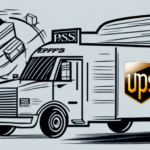Comparing Bulk Shipping Rates for FedEx and UPS
Running a business that requires bulk shipping demands selecting the right logistics partner. Among the top choices, FedEx and UPS stand out as the most popular options. This article provides a comprehensive comparison of the bulk shipping rates of FedEx and UPS, helping you make an informed decision for your business needs.
Understanding the Differences Between FedEx and UPS Shipping Services
Before delving into the costs, it's crucial to understand the fundamental differences between FedEx and UPS shipping services. Both companies offer a range of shipping options, including ground and express services, but they have distinct strengths.
- Delivery Speed: FedEx is renowned for its fast and reliable delivery times, making it ideal for time-sensitive shipments. FedEx Time-Definite Shipping services guarantee quick deliveries.
- Global Reach: UPS boasts an extensive global network, making it a preferred choice for international shipments. Their Global Shipping Solutions cater to businesses with international clientele.
- Customer Service: FedEx offers personalized customer service with dedicated account managers, fostering strong customer relationships. In contrast, UPS emphasizes a standardized approach focused on efficiency and speed.
- Pricing Structures: FedEx generally has higher base rates but provides substantial discounts for high-volume shippers. UPS tends to offer lower base rates with fewer discount opportunities.
How to Choose the Best Shipping Company for Your Business Needs
Selecting the right shipping company involves evaluating several key factors tailored to your business requirements:
- Package Size and Weight: Both FedEx and UPS offer tiered pricing based on package dimensions and weight. Assess your typical shipment sizes to determine which provider offers better rates for your specific needs.
- Delivery Speed: If quick delivery is paramount, FedEx's express services may be more suitable. For larger volumes with less urgency, UPS's ground services might offer better value.
- International Shipping: For businesses with global operations, UPS’s extensive international network provides efficient and cost-effective shipping solutions.
- Cost Considerations: Compare the overall cost, including base rates, additional fees, and potential discounts. Utilize online calculators from both companies' websites to estimate your shipping expenses.
- Customer Service: Reliable tracking, real-time updates, and responsive customer support are essential. Evaluate the quality and accessibility of each provider’s customer service.
- Special Requirements: If your shipments include hazardous materials or perishables, ensure the shipping company is certified and equipped to handle such items safely.
For a detailed guide on selecting the best shipping partner, refer to this comprehensive selection guide.
Factors to Consider When Deciding Between FedEx and UPS
When comparing bulk shipping rates between FedEx and UPS, consider the following factors to determine the best fit for your business:
- Package size and weight
- Delivery speed and times
- International shipping capabilities
- Add-on services (e.g., temperature-controlled shipping, freight forwarding)
- Additional fees and surcharges
Additionally, evaluate the quality of customer service, ease of tracking shipments, and the availability of support channels. Both providers offer various customer service options, but the responsiveness and effectiveness may vary.
Analyzing the Cost of Shipping with FedEx and UPS
FedEx and UPS offer a variety of pricing options for bulk shipping, including volume discounts and negotiated rates for large businesses. Here’s an overview based on recent data:
- FedEx: Typically, FedEx is slightly more expensive for smaller packages. However, they offer substantial discounts for high-volume shippers, potentially reducing costs significantly for large shipments.
- UPS: UPS often has lower base rates, making it more cost-effective for larger shipments. Their pricing structure is advantageous for businesses with consistent, high-volume shipping needs.
It's important to note that delivery times can impact costs. FedEx generally provides faster express delivery options, which may come at a premium, while UPS offers competitive rates for ground shipments. Both companies provide additional services like insurance and signature confirmation, which can add to the overall cost but offer enhanced security and tracking.
For accurate and up-to-date rate comparisons, utilize the pricing calculators available on the FedEx Rate Tools and UPS Rate Finder.
Evaluating the Efficiency of FedEx and UPS Delivery Services
Efficiency in bulk shipping is crucial to minimize delays and errors that can impact your business operations. Consider the following aspects when evaluating FedEx and UPS:
- Delivery Speed and Times: Assess the typical delivery times offered by each company and how they align with your business requirements.
- Tracking and Monitoring: Both FedEx and UPS provide robust tracking systems. FedEx's FedEx Tracking and UPS's UPS Tracking offer real-time updates, ensuring transparency throughout the shipping process.
- Customer Service and Support: Evaluate the availability and responsiveness of customer support. FedEx offers dedicated account managers, while UPS provides extensive online resources and support channels.
Efficiency is also reflected in how each company handles logistics and potential disruptions. Reviewing independent efficiency ratings can provide additional insights.
Benefits of Using FedEx or UPS for Bulk Shipping
Choosing FedEx or UPS for bulk shipping offers numerous advantages:
- Reliability and Speed: Both companies are trusted for their dependable shipping services and prompt delivery times.
- Add-On Services: Options such as temperature-controlled shipping, freight forwarding, insurance, and signature confirmation cater to diverse business needs.
- Global Reach: Extensive international networks enable efficient global shipping, facilitating business expansion.
Additionally, both providers offer advanced tracking systems, allowing businesses to monitor shipments in real-time. This feature enhances supply chain transparency and aids in managing customer expectations.
For more on the benefits of FedEx and UPS, visit their respective benefit pages and UPS service advantages.
Tips for Negotiating Lower Shipping Rates with FedEx or UPS
To reduce bulk shipping costs with FedEx or UPS, consider the following strategies:
- Freight Brokers: Engage a freight broker who can negotiate better rates on your behalf, leveraging their industry relationships.
- Volume Discount Programs: Enroll in volume discount programs offered by both companies to benefit from lower rates based on shipping frequency.
- Flexible Delivery Times: Opt for non-peak shipping times, which can result in reduced rates.
- Efficient Packaging: Optimize package size and weight to minimize dimensional weight charges. Consolidate multiple items into a single shipment when possible.
Additionally, regularly reviewing and renegotiating your shipping contracts can lead to better rates as your business scales. For more negotiation tips, refer to this shipping rate negotiation guide.
Understanding the Fine Print: Hidden Fees to Watch Out For
When comparing bulk shipping rates, it's essential to be aware of potential hidden fees that can affect your overall costs:
- Fuel Surcharges: Both FedEx and UPS apply fuel surcharges that fluctuate based on current fuel prices.
- Residential Delivery Fees: Delivering to residential addresses often incurs additional charges compared to commercial deliveries.
- Oversize Package Fees: Packages exceeding standard size or weight limits may attract extra fees.
- Address Correction Fees: Incorrect or incomplete addresses submitted by the shipper can result in additional charges for correction.
- Signature Confirmation Fees: Requiring a signature upon delivery may incur extra costs.
To avoid unexpected expenses, thoroughly review the FedEx fee schedule and UPS rate and fees information.
Real-Life Case Studies: Comparing Bulk Shipping Costs for Small Businesses
Examining real-life scenarios can provide valuable insights into the cost dynamics of FedEx and UPS for small businesses:
Case Study 1: U.S.-Based Small Business
A U.S. small business ships 100 packages weekly, each weighing under 5 pounds within the country. After rate comparison, UPS proves slightly cheaper, totaling approximately $1,500 per week, inclusive of all fees and surcharges.
Case Study 2: UK-Based Small Business
A UK-based small business ships 50 packages weekly to Europe and the U.S. FedEx offers a cost advantage for international shipments, with an estimated cost of £1,000 per week, including all fees.
Case Study 3: Australian Small Business
An Australian small business ships 200 packages weekly, each under 10 pounds domestically. UPS is significantly cheaper, with weekly costs around AUD 3,000, encompassing all additional fees and surcharges.
Case Study 4: Canadian Small Business
A Canadian small business ships 75 packages weekly within North America. FedEx emerges as the more economical option, with total weekly costs of CAD 1,500, inclusive of all charges.
These case studies highlight the importance of evaluating shipping needs and rates in the context of specific business operations.
Examining Customer Service and Support from FedEx and UPS
Reliable customer service is critical for managing bulk shipments efficiently. Both FedEx and UPS offer multiple support channels, including phone, email, and live chat. Key aspects to consider include:
- Response Times: How quickly does customer support respond to inquiries and resolve issues?
- Accessibility: Availability of support during business hours and through various channels.
- Online Resources: Comprehensive online knowledge bases, FAQs, and self-service tools to assist with common issues.
- Dedicated Support: Availability of account managers or dedicated support teams for large shippers.
FedEx is praised for its personalized customer service, which can be advantageous for businesses requiring tailored support. UPS, with its standardized approach, ensures consistent service quality and wide accessibility.
Enhancing Your Supply Chain with Efficient Bulk Shipping Solutions from FedEx or UPS
FedEx and UPS are robust choices for businesses seeking reliable and efficient bulk shipping solutions. To optimize your supply chain, consider the following:
- Integrate Shipping Software: Utilize shipping software that integrates with FedEx or UPS for seamless order processing and tracking.
- Optimize Inventory Management: Align your inventory levels with shipping schedules to ensure timely fulfillment.
- Leverage Data Analytics: Analyze shipping data to identify cost-saving opportunities and improve delivery performance.
By carefully evaluating factors such as package size, delivery speed, cost, and additional services, you can select the shipping partner that best aligns with your business objectives. Regularly reviewing and adjusting your shipping strategy will help maintain efficiency and support business growth.
For further information on enhancing your supply chain, explore our supply chain optimization resources.


















